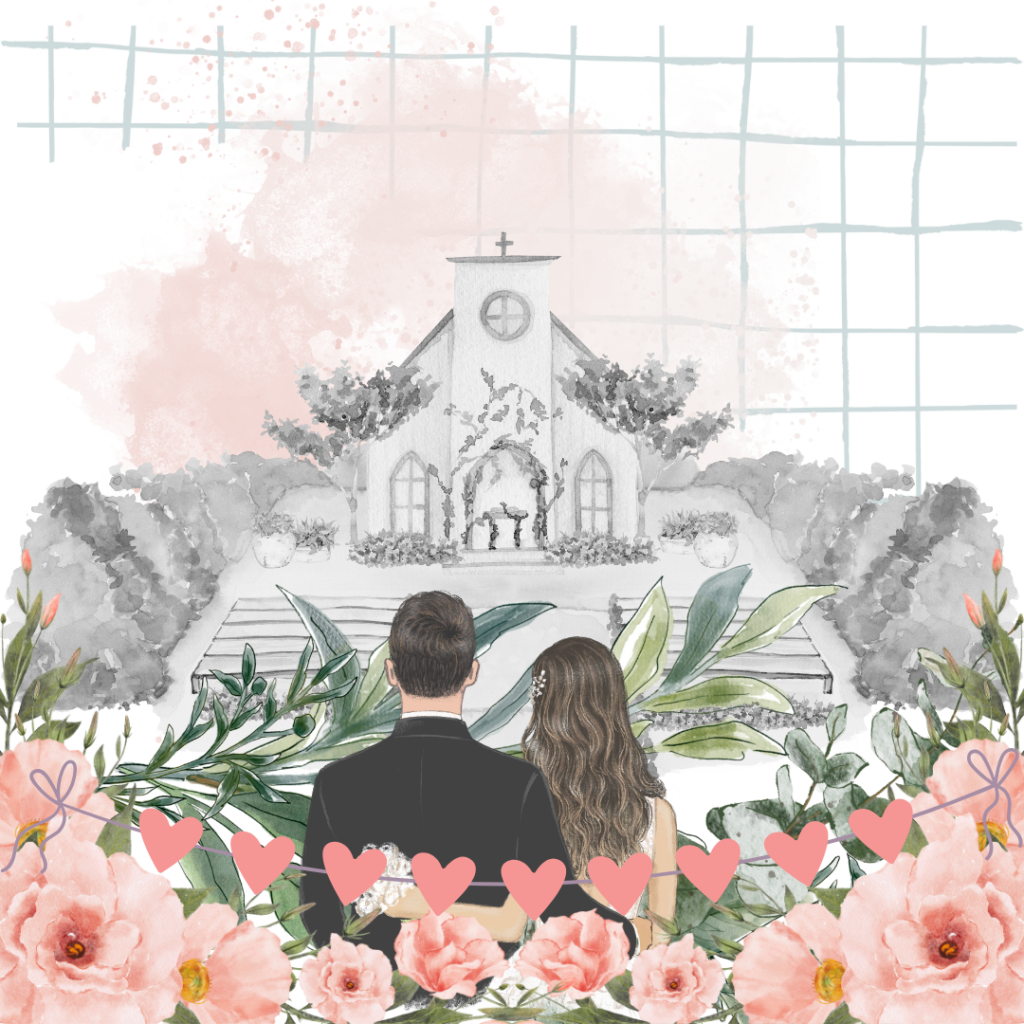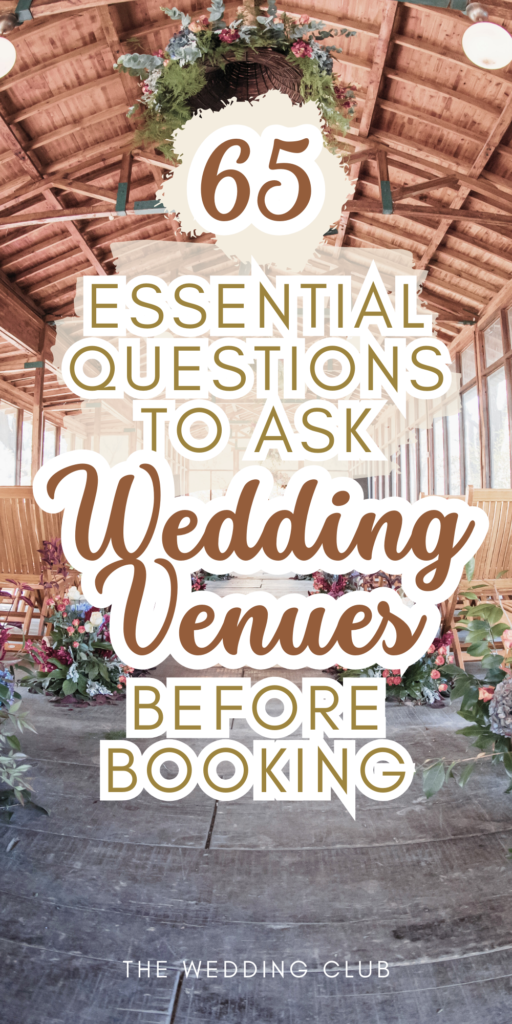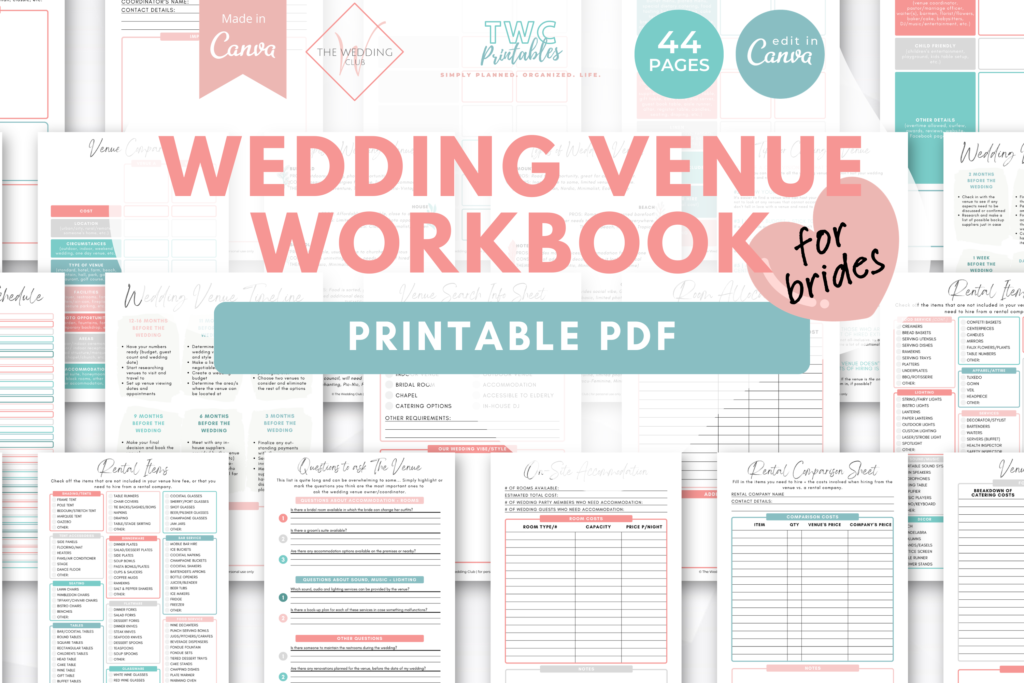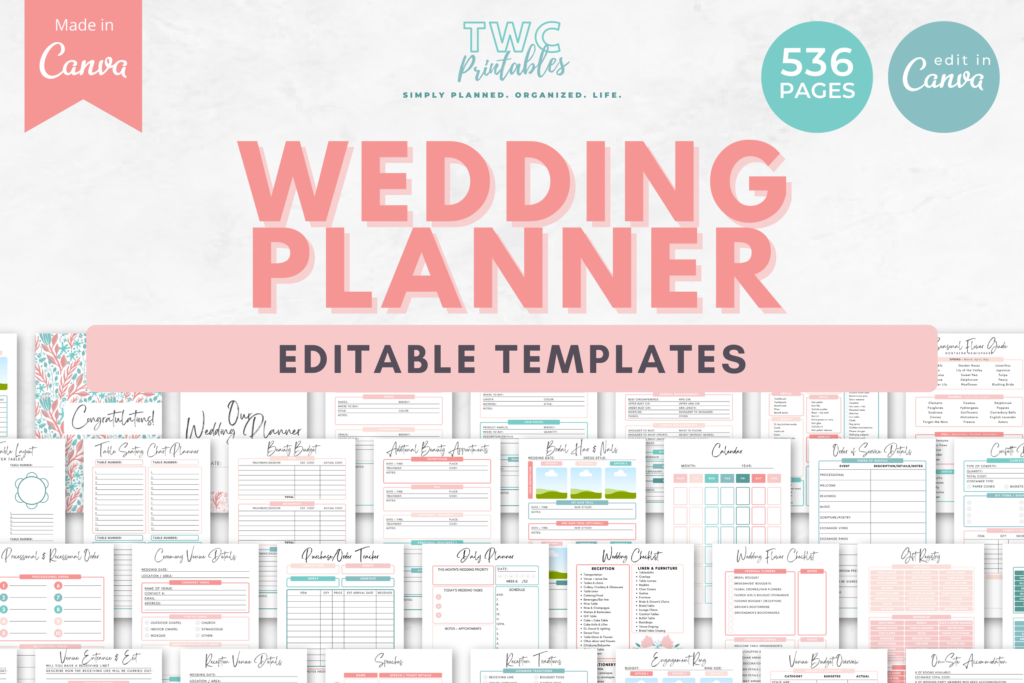Finding the perfect wedding venue can feel like a daunting task for many couples. With so many options to consider, it’s easy to get overwhelmed by the sheer number of choices and variables.
From gorgeous countryside estates to chic urban lofts, the possibilities seem endless.
But selecting a wedding venue is more than just choosing a beautiful space—it’s one of the most significant decisions you’ll make during your wedding planning process.
After all, your venue sets the tone for the entire day and influences everything from the decor and atmosphere to logistics and guest experience.
That’s why it’s crucial to have a solid set of questions to ask wedding venues before you make your final choice.
After all, your venue sets the tone for the entire day and influences everything from the decor and atmosphere to logistics and guest experience.
This blog post aims to serve as your ultimate guide, offering 65 essential wedding venue questions to ask when evaluating potential locations. We’ll walk you through each question in detail, covering all the aspects you need to consider—from budget and capacity to amenities and backup plans.
Our goal is to empower you with all the information necessary to make an informed decision, ensuring that the venue aligns perfectly with your vision and needs.

Knowing what to ask during venue tours not only saves time but also helps you avoid any hidden surprises down the line.
For example, discovering too late that the venue doesn’t provide ample parking or has a strict noise curfew could throw a wrench in your plans. By preparing a comprehensive list of wedding venue questions to ask, you’ll be able to address potential issues early on and make a confident, well-informed decision.
The right venue should check all your boxes, making it easier to create the wedding day you’ve always envisioned.
Looking for that perfect wedding venue?
Save time and effort by grabbing our printable wedding venue workbook! Scout and compare venues, work out various budgets, handle accommodation, and more!
Why Asking the Right Questions Matters
Wedding venues can vary widely in terms of what they offer, their pricing structures, and their policies. Without asking the right questions up front, it’s easy to overlook essential details that could lead to misunderstandings or, worse, unexpected costs later on.
This is why preparing a list of questions to ask wedding venues is so important.
Imagine finding your dream venue, only to realize after signing the contract that there’s a hefty fee for extending the event by an hour or that the venue’s in-house catering doesn’t align with your culinary preferences…
Maybe the parking situation is less than ideal, or you discover that their lighting and AV equipment are outdated…
These small details can add up quickly, impacting not only your budget but also the overall guest experience. All of these scenarios highlight why it’s essential to have a comprehensive wedding venue questions checklist that covers every aspect of what you want—and need—from your venue.
Important things to note before we get started
- You have to make an appointment to get all of the possible information. Try aiming for an appointment during a Saturday, early in the morning, while the staff at the venue are busy preparing for a wedding. The wedding coordinator, if they have one, can show you around and also show you some options. Note: Not all wedding venues will allow appointments on wedding days.
- Another thing, some venues pretend to be fully booked, so that they can over-charge interested clients. They may put you on a waiting list at an additional fee, and will contact you when a date opens up – little does the client know that there is no wedding taking place on that date. A venue which is almost fully booked, will appeal more to paying clients, because it may seem that it is a popular venue to get married at. Fortunately, you can politely ask the venue if they are fully booked or if they have possible discounts.
- You need to compare venues before you decide on a definite one. Even if you have a theme that only goes with that style venue, you might find a better one which can, for example, accommodate more guests, have cheaper packages, or includes certain suppliers (such as photographers, DJ’s, or even the wedding cake).
- A final thing worth noting is that some venues will allow only their own suppliers. Even, if you have your wedding cake made by a cake specialist or top baker/pastry chef in your area, your venue might have a pastry chef of their own, which you have to use. No exceptions. Ask the venue coordinator for their vendor list.
Now without further ado, let’s dive into the questions!
1. Budget & Costs: Setting the Right Expectations
1. What is the total rental fee for the venue, including any taxes or service charges?
Knowing the total rental fee upfront is essential for staying within your budget and avoiding unexpected expenses. Sometimes venues advertise a base price that doesn’t include taxes, service charges, or other hidden costs, which can quickly escalate the overall price.
Tip: Request a detailed written quote that breaks down all costs, including service charges, taxes, and additional fees, so you have a complete picture of what you’re paying for.
2. Are there any additional fees for using specific areas or amenities (e.g., bridal suite, outdoor space)?
Many venues charge extra for access to certain areas or amenities, such as a bridal suite, garden area, or kitchen facilities. Understanding what’s included in the base price and what costs extra can help prevent budgetary surprises.
Tip: Clarify if these fees are negotiable or if they can be bundled into the main rental cost. This could potentially save you some money.
3. Does the venue offer payment plans or require a deposit? If so, what is the payment schedule?
Payment plans can make managing your budget easier by breaking down the total cost into smaller, more manageable payments. Understanding the deposit amount and payment schedule upfront helps you plan your finances and avoids any surprises closer to your wedding date.
Tip: Ask if the deposit is refundable and under what conditions. This will give you peace of mind if your plans change unexpectedly.
4. Are there any hidden fees for setup, cleanup, or overtime hours?
Some venues have additional fees for setup, teardown, or exceeding your contracted time. Being aware of these costs can help you avoid unexpected charges that can add up quickly, especially if the venue charges by the hour.
Tip: Inquire about what happens if your event runs a little late. Knowing the overtime rate ahead of time can prevent last-minute surprises.
5. Does the venue provide liability insurance, or is that an additional cost we need to cover?
Liability insurance is often required by venues to protect against any damages or injuries that occur during the event. It’s crucial to know if this cost is included or if you’ll need to purchase separate insurance.
Tip: If the venue doesn’t provide liability insurance, ask for recommendations on affordable insurance providers that specialize in event coverage.
6. Are there any discounts for booking off-season dates, weekdays, or during specific times of the year?
Many venues offer discounts for weddings held during off-peak times, such as weekdays or off-season months. This can significantly reduce your venue costs and open up more options within your budget.
Tip: Consider being flexible with your wedding date. Booking a venue during off-peak times can sometimes yield discounts of up to 20-30% or include complimentary add-ons like additional rental hours or upgraded decor options.

2. Availability & Logistics: Timing Is Everything
7. Is the venue available on my preferred date, and how far in advance should we book?
Venue availability is often the determining factor for choosing a wedding date. Popular venues can be booked out months, if not years, in advance. Knowing whether your preferred date is open will help you decide if you need to be flexible or secure the booking quickly.
Tip: If your date is flexible, ask for a list of open dates to see if booking during an off-peak time could save you money or provide additional benefits.
8. Can we hold our rehearsal or other pre-wedding events at the venue, and is there a separate fee?
Hosting multiple events, such as the rehearsal dinner or welcome party, at the same venue can streamline logistics and create a cohesive experience. It’s essential to know if there are additional fees or availability constraints.
Tip: Some venues offer discounts or complimentary access to spaces for pre-wedding events if you book the main event with them. Don’t hesitate to ask for package deals.
9. What is the maximum capacity for the venue, and does it vary for indoor vs. outdoor spaces?
Understanding the venue’s capacity ensures that it can comfortably accommodate all of your guests. Capacity restrictions may differ for indoor and outdoor areas, impacting your seating arrangements and layout options.
Tip: When asking about capacity, consider any additional space needed for dance floors, band setups, or photo booths, as these can reduce available guest seating.
10. How many events does the venue host on the same day, and what impact could that have on my wedding?
Some venues host multiple events on the same day, which could lead to timing conflicts or reduced attention from staff. Knowing this helps you understand potential impacts on setup, teardown, and overall experience.
Tip: If the venue hosts more than one event per day, ask about how they manage overlapping events to ensure privacy and exclusivity for your celebration.
11. What is the earliest time we can arrive to set up, and when must we vacate the premises?
Knowing the setup and breakdown times helps coordinate with your vendors, such as florists, caterers, and photographers. This information is crucial for ensuring everything is ready before guests arrive and wrapped up in a timely manner afterward.
Tip: Request extra time for setup or teardown in advance if you feel you may need it. Some venues allow extended hours for an additional fee.
12. Are there any noise ordinances or restrictions on the timing of music and entertainment?
Noise restrictions can limit how long your band or DJ can play, especially if the venue is in a residential area or has specific local regulations. This can impact the flow and enjoyment of your reception.
Tip: Ask about the best time to schedule lively activities like dancing and speeches, so you can enjoy these moments before any noise curfews take effect.
Looking for that perfect wedding venue?
Save time and effort by grabbing our printable wedding venue workbook! Scout and compare venues, work out various budgets, handle accommodation, and more!
3. Venue Layout & Amenities: Making Sure the Space Works for You
13. Can you provide a floor plan or layout of the venue to help us visualize the space?
A floor plan allows you to visualize the layout of the venue, making it easier to plan seating arrangements, dance floor placement, and decor setup. Understanding the spatial dynamics ensures that everything fits comfortably and flows smoothly for both guests and vendors.
Tip: Request a digital copy of the floor plan that you can share with your wedding planner and vendors. This will facilitate efficient planning and help avoid any surprises during the setup.
14. Are there separate spaces for the ceremony, cocktail hour, and reception, or will we need to transition areas?
Having separate spaces for each part of your wedding (ceremony, cocktail hour, and reception) can create a seamless flow for the event and prevent downtime or awkward transitions. Knowing this ahead of time also helps you plan your decor and seating arrangements for each space.
Tip: If the venue doesn’t have separate spaces, ask how they manage transitions. Some venues can quickly transform a single space with minimal disruption, but it’s essential to clarify the process.
15. What types of furniture (tables, chairs, etc.) are included, and are there options to upgrade or rent additional items?
Understanding what furniture is provided saves you the hassle of renting additional items. It’s also important to know if the furniture fits your aesthetic or if you’ll need to upgrade to achieve your desired look.
Tip: If upgrades are available, ask for a catalog or samples to ensure the items match your theme. Booking upgraded furniture through the venue can sometimes be more cost-effective and convenient than using an external vendor.
16. Does the venue provide any audiovisual equipment (microphones, speakers, projectors), or will we need to rent our own?
AV equipment is essential for speeches, toasts, music, and video presentations. Knowing what’s included helps avoid last-minute scrambling or unexpected rental costs.
Tip: Test the venue’s AV equipment ahead of time to ensure it works properly. Ask if there is on-site technical support during the event to handle any issues that might arise.
17. Are there any restrictions on how we can arrange the space or hang decor from walls and ceilings?
Some venues have restrictions on altering the space or attaching decor to walls and ceilings. Knowing these restrictions in advance can prevent you from purchasing decor items that you won’t be able to use.
Tip: If the venue has restrictions, ask for a list of recommended ways to personalize the space or for suggested vendors who have experience working with the venue’s limitations.
18. Is the venue wheelchair accessible and able to accommodate guests with mobility issues?
Ensuring that your venue is accessible shows consideration for all guests, including those with mobility challenges. It’s also a legal requirement for many venues to provide accessible entrances, restrooms, and seating options.
Tip: Visit the venue in person with accessibility in mind. Check for ramps, elevators, and accessible restrooms, and ask if there are staff members available to assist guests with mobility needs on the day of the event.
4. Services & Packages: Understanding What’s Included
19. What services are included in the venue rental fee (e.g., security, setup/teardown, coordinator)?
Understanding exactly what services are included in the rental fee helps you budget more effectively and prevents unexpected costs. Some venues may include essential services like setup and teardown, while others charge separately for these, impacting your total expenses.
Tip: Get a written list of all included services and confirm if there are any additional fees for services like security, cleanup, or event management to avoid budget surprises.
20. Does the venue offer all-inclusive packages, and what do they cover?
All-inclusive packages can simplify the planning process by bundling multiple services such as catering, bar options, and decor. Knowing what’s covered allows you to determine whether the package meets your needs or if you’ll need to add external services.
Tip: Compare the cost of all-inclusive packages with the expenses of hiring vendors individually to see which option offers better value for your budget and requirements.
21. Are there specific vendors we are required to use, or can we bring in our own caterers, florists, and DJs?
Some venues have a preferred vendor list, which can limit your choices for services like catering, florists, or entertainment. Knowing this helps you decide if the recommended vendors align with your style, budget, and preferences, or if you need to consider other venues with more flexibility.
Tip: If you prefer using your own vendors, ask if the venue charges additional fees for external vendors or if there are any vendor approval processes. These fees can sometimes be negotiated if you make a strong case for your preferred vendor.
22. Are linens, tableware, and flatware included in the package, or must we rent them separately?
Including or excluding linens, tableware, and flatware can significantly impact your budget and the overall aesthetic of your event. Venues that don’t provide these items will require you to rent them separately, which can add logistical complexity and additional costs.
Tip: If linens and tableware are included, ask to see samples to ensure they match your wedding’s color scheme and style. This will save time and effort when coordinating your decor.
23. What is the policy on using external vendors? Are there any vendor fees or requirements for outside services?
Understanding the venue’s policy on external vendors can help you avoid unexpected fees, such as vendor management fees or insurance requirements. Some venues require that external vendors meet specific standards or provide insurance coverage, which can add to your overall costs.
Tip: If you plan to bring in external vendors, request a copy of the venue’s vendor policy and share it with your vendors early on. This will help them prepare the necessary documents and meet the venue’s requirements without delays.
24. Does the venue provide a day-of coordinator, and what specific duties do they handle?
A day-of coordinator can significantly reduce stress by managing timelines, vendor coordination, and last-minute issues. Knowing if the venue provides this service (and what their role entails) helps you decide whether you need to hire an additional wedding planner.
Tip: Clarify the coordinator’s responsibilities and ask if they will be present for the entire event. If their duties are limited, consider hiring an independent coordinator for more comprehensive support on your wedding day.

5. Catering & Bar Options: Food and Drink Decisions
25. Does the venue have in-house catering, or do we need to hire an external caterer?
Understanding whether the venue provides in-house catering or allows external caterers helps you plan your budget and menu choices. Venues with in-house catering may offer a more seamless experience, but you may be limited in terms of menu options. Conversely, hiring an external caterer provides flexibility, but could involve additional costs and logistics.
Tip: If the venue requires you to use their in-house catering, ask for menu samples and customization options to ensure it meets your expectations. If external caterers are allowed, inquire about any kitchen fees or setup requirements.
26. Can we schedule a tasting before making final menu decisions, and is there a cost for tastings?
A tasting lets you experience the quality and presentation of the food before making a commitment. This helps ensure that the menu aligns with your preferences and meets your standards. Some venues charge for tastings, while others include it in the package.
Tip: Schedule the tasting several months before the wedding date so you have time to make adjustments. If there’s a cost, ask if it can be applied as a credit toward your final catering bill.
27. What are the options for bar services (e.g., open bar, cash bar, BYOB), and what are the associated costs?
A tasting lets you experience the quality and presentation of the food before making a commitment. This helps ensure that the menu aligns with your preferences and meets your standards. Some venues charge for tastings, while others include it in the package.
Tip: If opting for a BYOB service, check if the venue charges corkage fees. This can sometimes be negotiated or waived, especially if you’re using the venue’s bartenders.
28. Does the venue offer menu customization to accommodate dietary restrictions or cultural preferences?
Accommodating dietary restrictions and cultural preferences is essential to ensure that all guests can enjoy the meal. Some venues may have limited flexibility in menu adjustments, so it’s important to discuss customization options early on.
Tip: Provide a list of common dietary restrictions (e.g., vegetarian, gluten-free, nut-free) and ask if the venue can accommodate them. It’s also helpful to ask if these customizations will incur additional costs.
29. Are there any corkage or cake-cutting fees if we bring in our own wine or cake?
Many venues charge a corkage fee for bringing your own alcohol or a cake-cutting fee if you’re bringing in an outside cake. These fees can add up quickly, especially if you plan to provide your own drinks or have a specialty cake made elsewhere.
Tip: If corkage or cake-cutting fees are high, ask if they can be negotiated or if there are alternative solutions, such as using the venue’s alcohol packages or cake services.
30. Are there restrictions on the type of alcohol that can be served, and are bartenders provided?
Some venues have restrictions on the types of alcohol that can be served or require licensed bartenders to be present. Understanding these rules ensures compliance and prevents any issues on the day of the event.
Tip: If bartenders are not included, ask for recommendations on licensed bartenders familiar with the venue’s rules. This will save time and ensure a smooth service during the event.
6. Guest Accommodations & Transportation: Ensuring Guest Comfort
31. Does the venue offer on-site accommodations for guests, or are there nearby hotels you recommend?
On-site accommodations or proximity to hotels make it convenient for out-of-town guests and those who prefer not to drive after the celebration. Understanding the options available ensures guests have a comfortable stay and a positive overall experience.
Tip: If the venue doesn’t offer on-site accommodations, ask for a list of recommended hotels. Some venues even have partnerships with local hotels that provide discounts or shuttle services for guests.
32. Are there group rates or room blocks available for guests at nearby hotels?
Group rates or room blocks help ensure your guests have access to reasonably priced accommodations, especially during peak seasons. It also keeps everyone in the same location, making transportation to and from the venue easier to coordinate.
Tip: When inquiring about room blocks, ask if there are any perks for booking a certain number of rooms, such as free upgrades, complimentary shuttles, or a discounted suite for the couple.
33. Is there ample parking available for guests, and is it free or valet only?
Parking availability can significantly impact the guest experience, especially if parking is limited or expensive. Knowing the parking situation helps you plan whether additional transportation is needed or if valet services should be arranged.
Tip: If parking is limited, ask if the venue can reserve a certain number of spaces for your event or if they have a partnership with nearby parking facilities. Providing guests with clear parking instructions in advance will also help avoid confusion on the day of the event.
34. Does the venue offer shuttle services or have partnerships with transportation companies?
Shuttle services are a convenient option for guests staying at nearby hotels or for those who prefer not to drive. Venues that offer shuttle services or have partnerships with transportation companies can simplify logistics and ensure guests arrive on time.
Tip: If shuttle services are available, ask about scheduling, capacity, and whether there’s an additional fee. For venues that don’t offer shuttles, inquire about recommended transportation companies that provide discounts for wedding groups.
35. What is the venue’s policy on providing overnight accommodations for the bridal party and family members?
If you want to have the bridal party or family members stay on-site, understanding the venue’s policies and availability of accommodations is crucial. Some venues offer special packages or complimentary rooms for the couple and their family members.
Tip: Ask if there are bridal party suites or special areas where the wedding party can get ready, relax, or spend the night. It’s also a good idea to see if they offer a late checkout option for the day after the wedding.
36. Are there restrooms on-site, and if not, do we need to rent portable restrooms?
Restroom facilities are a necessity for any event. If your venue lacks adequate restrooms or if your guest count exceeds the venue’s capacity, you may need to rent additional facilities. This ensures guest comfort and prevents long lines, especially during the reception.
Tip: If renting portable restrooms, consider upscale options like restroom trailers that come with additional amenities such as lighting, mirrors, and climate control to maintain a more comfortable and elegant atmosphere.
Looking for that perfect wedding venue?
Save time and effort by grabbing our printable wedding venue workbook! Scout and compare venues, work out various budgets, handle accommodation, and more!
7. Wedding Day Management: Who Handles What?
37. Who will be my primary point of contact leading up to and on the day of the wedding?
Having a designated point of contact streamlines communication and ensures that someone is familiar with all the details of your wedding. This person will be your go-to for any questions or concerns, making the planning process and day-of coordination much smoother.
Tip: Ask for the contact information of the designated person and set up a meeting or call to go over your plans and expectations. Establish a preferred method of communication and set response time expectations to ensure prompt communication.
38. Is there an on-site coordinator or event manager who will assist during the event?
An on-site coordinator or event manager is invaluable on the wedding day. They handle logistics, ensure everything runs on schedule, and resolve any unexpected issues, allowing you and your family to focus on enjoying the day.
Tip: Clarify the coordinator’s responsibilities, such as overseeing setup, managing vendors, and handling guest inquiries. If the role seems limited, consider hiring an additional day-of coordinator for more comprehensive support.
39. What is the venue’s policy for handling emergencies or last-minute changes?
Emergencies and last-minute changes can happen, from weather disruptions to vendor no-shows. Understanding the venue’s policies for handling such situations will give you peace of mind and allow you to plan for potential contingencies.
Tip: Discuss specific scenarios with the venue (e.g., power outages, rain, delays) and ask about their standard operating procedures. Make sure there’s an emergency contact list for all key personnel and vendors.
40. Does the venue provide staff for setup, serving, and breakdown, or do we need to hire additional personnel?
Knowing what staffing is provided helps you plan whether additional personnel are needed for setup, serving, or teardown. Some venues only provide basic staff, which could mean extra costs and logistics if you need to hire more help.
Tip: If staff are provided, ask about their specific duties, timelines, and attire. This ensures their role aligns with your expectations and the overall feel of your wedding.
41. What is the policy if our designated contact is unavailable on the day of the event?
Having a backup plan for your main contact person is crucial in case they become unavailable due to illness or other unexpected reasons. Knowing the backup plan ensures continuity in management and that the details of your wedding aren’t overlooked.
Tip: Request to meet or communicate with the backup person (if one is assigned) prior to the wedding day. This way, they’ll be familiar with your plans and expectations, minimizing disruption if a change is necessary.
42. Can we arrange a final walkthrough to confirm all details with the coordinator before the event?
A final walkthrough is essential for confirming all logistics, layouts, and timing with the venue staff and vendors. It ensures everyone is on the same page and helps identify and resolve any potential issues before the wedding day.
Tip: Schedule the walkthrough one to two weeks before the wedding with all key vendors and your coordinator present. Bring a checklist of all final details, including setup instructions, vendor arrival times, and decor placement.

8. Decor & Ambiance: Personalizing the Space
43. Are there any restrictions on using open flames, confetti, or hanging decor from ceilings?
Many venues have strict regulations regarding the use of open flames, confetti, or hanging decor due to safety concerns and facility preservation. Understanding these restrictions beforehand helps you plan your decor more effectively and prevents potential fines or penalties.
Tip: If open flames are prohibited, consider using LED candles or lanterns as alternatives. For confetti, ask about using eco-friendly options like flower petals or biodegradable materials.
44. Can we rearrange furniture and decor, or are there layout limitations?
Knowing whether you can rearrange furniture or decor allows you to better customize the space to suit your wedding theme and guest flow. Some venues have fixed setups or limitations due to safety or aesthetic reasons, which can impact your overall design plan.
Tip: Discuss your layout ideas with the venue coordinator during your initial visits. Bring a rough sketch of your envisioned setup, and ask if it’s feasible within the venue’s constraints.
45. Does the venue provide any lighting options, or will we need to bring in additional lighting?
Lighting plays a crucial role in setting the mood and atmosphere of your wedding. Some venues offer basic lighting, while others require you to bring in additional fixtures. Knowing this helps you budget and plan for the type of lighting you need.
Tip: Ask if the venue has dimmable lighting, chandeliers, or spotlights for key areas like the dance floor. If they don’t provide these options, consider hiring a lighting professional who can enhance the ambiance.
46. Are candles, string lights, or other decorative lighting permitted, and are there power outlets available?
Candles and string lights add a romantic and whimsical touch, but many venues have restrictions due to fire safety regulations. Confirming what’s allowed ensures you can safely incorporate these elements without compromising your vision.
Tip: If string lights are permitted, check if there are enough power outlets available or if you’ll need to bring extension cords. Ask if the venue has preferred vendors who specialize in lighting setup.
47. Can we bring in our own decor items, such as signage, drapery, or rented furniture?
Personal decor items can help bring your vision to life, but some venues have restrictions on external decor to preserve the property or maintain a cohesive look. Knowing what you can bring in will help you plan decor rentals or purchases effectively.
Tip: If bringing in your own decor, coordinate with the venue to determine setup and teardown times. Some venues have specific schedules for external vendors, so it’s important to align your timeline with their availability.
48. Are there decor or color schemes that don’t work well with the venue’s existing design?
Some venues have strong architectural features, color schemes, or decor styles that might clash with certain themes or color palettes. Understanding what complements the space helps you make better design choices and avoid decor that feels out of place.
Tip: Ask the venue coordinator for photos of past events to see which themes and colors have worked well in the space. This can inspire your own decor decisions and help create a cohesive look.
9. Backup Plans & Weather: Preparing for the Unexpected
49. Is there a backup plan or indoor option if the weather doesn’t cooperate for an outdoor ceremony or reception?
Weather can be unpredictable, and having a solid backup plan for outdoor events is essential to ensure your wedding proceeds smoothly regardless of conditions. Understanding if the venue has an indoor space or covered area available gives you peace of mind that your celebration won’t be disrupted by rain, wind, or extreme temperatures.
Tip: Ask to see the backup space during your venue visit to ensure it meets your aesthetic and capacity requirements. This will help you envision how your event might look if it needs to be moved indoors.
50. What is the policy for moving the event indoors or to a covered area due to inclement weather?
Knowing the policy for transitioning your event to a backup space is crucial for making quick decisions if the weather turns bad. Some venues require advance notice or have specific criteria for deciding when to move indoors, which can impact your day-of timeline.
Tip: Clarify the latest possible time you can decide to move indoors and what staff support is available for making the transition seamless. Establishing a weather plan with your coordinator ahead of time can minimize last-minute stress.
51. Are there tents or canopies available to rent for outdoor events, and what is the associated cost?
Tents or canopies provide coverage for outdoor events, protecting guests from rain or direct sunlight. If the venue doesn’t include these, you’ll need to consider renting them, which can add to your budget. Understanding availability and costs helps you make an informed decision.
Tip: Ask about different tent sizes and styles to ensure they fit your guest count and aesthetic. If renting, book early to secure availability, especially during peak wedding season.
52. Does the venue provide heating or cooling options, such as fans or portable heaters, for extreme weather conditions?
Heating and cooling options are critical for keeping guests comfortable during extreme weather conditions, especially for outdoor or partially covered venues. Confirming what the venue offers helps you plan accordingly, whether it’s bringing in portable heaters for a chilly evening or fans for a hot afternoon.
Tip: If the venue doesn’t offer these amenities, ask for recommended vendors who provide climate control equipment, and consider their availability and setup requirements when planning your event timeline.
53. What are the power and lighting options for outdoor spaces if the event continues into the evening?
Adequate power and lighting are essential for evening events to ensure safety and maintain the right ambiance. Venues may have limited power sources or specific requirements for lighting setups, so understanding these options in advance is necessary to avoid unexpected challenges.
Tip: If outdoor power is limited, consider renting a generator to support additional lighting or AV equipment. Check with the venue on where power outlets are located to position lighting and decor elements strategically.
54. If we need to change the date due to weather, what is the venue’s rescheduling policy?
Severe weather or unforeseen circumstances may necessitate rescheduling your event. Understanding the venue’s policy on date changes—including any fees or blackout dates—will help you plan for worst-case scenarios without incurring significant financial loss.
Tip: Inquire about flexibility in rescheduling policies due to weather, and ask if the venue offers “rain insurance” or similar programs that can mitigate costs associated with last-minute changes.
Looking for that perfect wedding venue?
Save time and effort by grabbing our printable wedding venue workbook! Scout and compare venues, work out various budgets, handle accommodation, and more!
10. COVID-19 & Health Protocols: Navigating the New Normal
55. What are the venue’s current health and safety protocols in response to COVID-19?
Understanding the venue’s health and safety protocols is crucial to ensure compliance with local regulations and to make sure guests feel comfortable and safe. Protocols can include social distancing measures, mask mandates, or vaccination requirements, all of which can impact guest attendance and overall event logistics.
Tip: Ask for a written copy of the venue’s current health and safety guidelines so you can share it with your guests in advance. This will help everyone prepare and minimize confusion on the day of the event.
56. What is the maximum capacity for events under current health guidelines, and how might that change?
Capacity restrictions can affect your guest list and seating arrangements. Knowing the current maximum capacity helps you plan your guest count accordingly, while also being prepared for potential changes if restrictions are lifted or tightened.
Tip: Ask if the venue has a contingency plan for scaling the event up or down depending on any changes in health guidelines closer to your wedding date.
57. Does the venue offer virtual tour options for those unable to visit in person?
Virtual tours are a great alternative for couples or family members who can’t visit the venue in person due to health concerns or travel restrictions. This option allows you to evaluate the space and ask questions remotely, making planning more accessible.
Tip: If a virtual tour is available, ask if it includes a live walkthrough with the venue coordinator so you can ask questions in real-time and get a better sense of the space’s layout.
58. What is the policy for postponing or canceling due to changes in COVID-19 restrictions?
Sudden changes in COVID-19 restrictions could force you to postpone or cancel your event. Understanding the venue’s policies regarding these situations—including any fees or rebooking options—helps you plan financially and logistically for such scenarios.
Tip: Ask if the venue offers flexible rescheduling options or credits that can be applied to a new date. Check if there’s a deadline for making these changes to avoid last-minute complications.
59. Are there any additional sanitation measures or requirements for guests (e.g., masks, hand sanitizer stations)?
Knowing the venue’s sanitation measures and guest requirements helps you communicate expectations to your guests and vendors. It ensures everyone follows the same safety protocols, minimizing health risks during the event.
Tip: Consider setting up additional sanitation stations with hand sanitizers and masks at key locations like entrances, restrooms, and dining areas. This provides extra peace of mind for you and your guests.
60. Can we have a hybrid event with both in-person and virtual components, and what equipment would be needed?
Hybrid events allow you to include guests who can’t attend in person, making your wedding accessible to a wider audience. Knowing if the venue can accommodate live streaming or virtual setups is important for planning and ensuring a smooth experience for virtual attendees.
Tip: If the venue doesn’t provide the necessary equipment, ask if they have preferred vendors who specialize in live streaming. Test the equipment in advance to ensure everything runs smoothly on the day of the event.

11. Contract & Policies: Understanding the Fine Print
61. What is the payment schedule, and what forms of payment are accepted?
Understanding the payment schedule helps you plan your finances and avoid late fees or payment delays. Knowing what forms of payment are accepted (credit card, bank transfer, etc.) allows you to make transactions easily and securely.
Tip: Ask if there are any incentives for early payment or if any penalties are applied for late payments. Ensure you have a copy of the payment schedule in writing so you can stay on top of deadlines.
62. What are the policies for cancellations or changes to the contract, and are there any associated fees?
Unexpected changes can happen, and knowing the cancellation or amendment policies helps protect you from incurring high fees. This also gives you a clear understanding of your options if you need to reschedule, downsize, or cancel the event.
Tip: Ask if the venue offers a “grace period” for changes without fees. Some venues may allow changes up to a certain date at no cost, giving you more flexibility in your planning process.
63. What insurance and liability requirements do we need to fulfill to book the venue?
Many venues require liability insurance to protect against any damage or accidents during the event. Understanding these requirements early on ensures you have the proper coverage in place, which can prevent legal and financial complications.
Tip: If you don’t already have liability insurance, ask the venue if they can recommend trusted providers who specialize in event insurance. Check if your home or renter’s insurance policy offers event coverage as an add-on.
64. Are there any noise restrictions or curfews that could affect the timing of the event?
Noise restrictions and curfews can impact the flow and duration of your wedding, especially for outdoor venues or those located in residential areas. Knowing these restrictions helps you schedule entertainment and activities accordingly.
Tip: If there are strict noise restrictions, consider using lower-volume alternatives like acoustic music or silent disco options. Discuss these restrictions with your band or DJ to ensure they are aware of any limitations.
65. What are the penalties or fees if we need to extend the event beyond the contracted time?
Overtime fees can add up quickly if your event runs longer than expected. Understanding these fees allows you to plan your event timeline realistically and budget for any potential extra time you may want to add to the celebration.
Tip: Ask if there’s a buffer period before overtime fees are charged. Some venues provide a 15-30 minute grace period before applying additional fees, which can be helpful if your event runs slightly behind schedule.
66. Is there a policy for handling unforeseen circumstances, such as natural disasters or power outages?
Unforeseen circumstances like natural disasters, power outages, or other emergencies can disrupt your event. Knowing the venue’s policy for handling these situations ensures that there are contingency plans in place, reducing stress if the unexpected occurs.
Tip: Discuss specific scenarios and ask what backup measures the venue has, such as generators for power outages or alternative dates for rescheduling. Consider investing in event insurance that covers unforeseen circumstances to protect your investment.
Other questions to ask wedding venues...
If your wedding involves specific cultural or religious traditions, it’s crucial to confirm whether the venue can accommodate these practices. Some venues may have restrictions or lack the necessary amenities, such as separate preparation areas or designated prayer spaces.
Some venues use sound limiters or have policies that cut off power to music equipment if noise levels exceed a certain decibel. Understanding these limitations helps you plan the type of entertainment you can have and prevents disruptions during the event.
If you want your furry friend to be part of your wedding day, you’ll need to confirm the venue’s pet policy. Some venues may have restrictions or require additional fees and liability coverage for pets on-site.
Venues that are open to the public, such as parks or hotels, or those that host multiple events on the same day, can pose privacy challenges. Understanding how the venue manages privacy ensures that your event remains intimate and undisturbed.
Having a designated space to get ready makes the day more comfortable and organized. Some venues offer bridal suites or groom’s lounges with amenities like full-length mirrors, refreshments, and private restrooms.
Some venues have strict policies on when vendors can arrive, set up, and remove their items. Knowing these policies helps you coordinate with your vendors and avoid any issues with timing or venue management.
Ensuring that guests with special needs are comfortable and accommodated is an essential part of hosting an inclusive event. This includes accessibility features and food options that cater to various dietary restrictions.
Knowing the venue’s smoking policy helps you manage guests who smoke and ensures compliance with any local regulations or venue rules. This is particularly important for outdoor venues where smoking may be restricted.
Vehicle access can impact how easy it is for vendors to deliver goods or for the couple to make a grand entrance or exit. Some venues have restrictions on large vehicles due to space limitations or safety concerns.
Some venues have established relationships with local vendors that can simplify planning and potentially reduce costs. These partnerships may also offer exclusive discounts or packages to clients of the venue.
Looking for that perfect wedding venue?
Save time and effort by grabbing our printable wedding venue workbook! Scout and compare venues, work out various budgets, handle accommodation, and more!


by Tanya Guilfoyle
Born in Johannesburg, South Africa, Tanya has been an active contributor and planner in the wedding industry since 2016. When not writing useful content for brides and wedding professionals, she can be found designing templates for her Etsy shop, TWCprintables.
Planning a Wedding?
Save time and effort by grabbing our Wedding Planner Bundle! With over 500+ pages to choose from + edit, we made sure to not leave anything out, giving you peace of mind!




